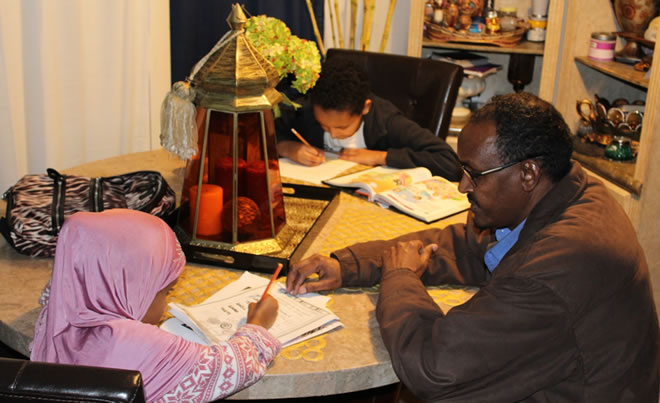by Abdikadir Bashir Mohamud
Friday, May 13, 2016

A Somali Father helping his school-aged children with their homework in SW Portland-, January 2016
Portland’s Public School (PPS) system is failing the Somali student population. Somali student achievement levels are a fraction of their white counterparts. In addition to a 58 percent graduation rate, only 17 percent of these students are passing the State reading exams and just 7 percent are passing the math exams. Somali youth currently represent the district’s third largest immigrant community and are the fastest growing English Language Learner (ELL) student population. Two years ago, a group of Somali parents and advocates presented to Portland Public School Board pleading for the board and administration to address the education crisis facing Portland’s Somali student population.
In October 2015, Portland Public Schools, at the continued urging of Portland’s Somali community, released performance data on the Somali Student population. The initial findings revealed that not only do Somali students experience significant disparities in academic achievement, but also issues in accurate data collection create barriers to setting disparity reduction targets and implementing the policy and program changes needed to achieve those targets. As a result, this group of parents, educators, and engaged community members convened the Somali Education Task Force (SETF) to:
a) Further research these preliminary PPS findings
b) Provide a history of the Somali community in Oregon
c) Raise awareness of the education disparities facing culturally-identified Somali students Highlight the social and cultural disconnect contributing to poor academic performance and inadequate teacher training
d) Assess the accessibility and efficacy of current resources and
e) Put forth a set of recommendations for policymakers, school administration, teachers as well as the Somali student and parents.
Effective teachers and time in the classroom are critical to student success. Yet Somali students experience higher levels of discipline for offenses often rooted in cultural misunderstanding. For the Somali student population, time outside of the classroom compounded with additional cultural and language barriers contribute to significant education disparities and poor graduation rates. These disparities in student success ultimately limit the potential of Oregon’s student population and impact the economic security of our young adults and thus our State.
The SETF conducted a community survey of over a hundred Somali students and parents, which revealed that academic achievement is embedded in the community’s culture, value system and daily practice. Survey results highlighted a strong belief within the Somali community that improving educational opportunity is an imperative foundation for youth and community success. Additionally, the survey illuminated the lack of student resources, the inadequacy of existing supports, and a deeper cultural disconnect contributing to poor outcomes. It is imperative that Portland Public Schools partner with the Somali community to foster a culture of accountability that reinforces and ensures the commitment of all district staff and the community members to the education of all students. With this foundation, SETF recommends Portland Public School board, administration, and teachers to
a) Establish an advisory board to oversee the report’s recommendations
b) Improve the process of teacher hiring and training practices
c) Set disparity reduction targets and
d) Outline specific recommendations for student and parent support systems.
These recommendations come directly from the Task force’s report and can help bridge the gap between aspirational goals and improved outcomes. Educational attainment is a core value of the Somali community. In recent years, this spirit has been challenged by the communities’ realization that most of Somali students have been academically underperforming. It is critical that policymakers, school administrators and teachers all understand the culture from which Somali students emerge, which can and should inform improved services and education for these students and Somali American communities.
For a complete look at this report and its findings, please contact Abdikadir Bashir Mohamud at the Center for African Immigrants and Refugees of Oregon (CAIRO). He can be reached via his email [email protected].